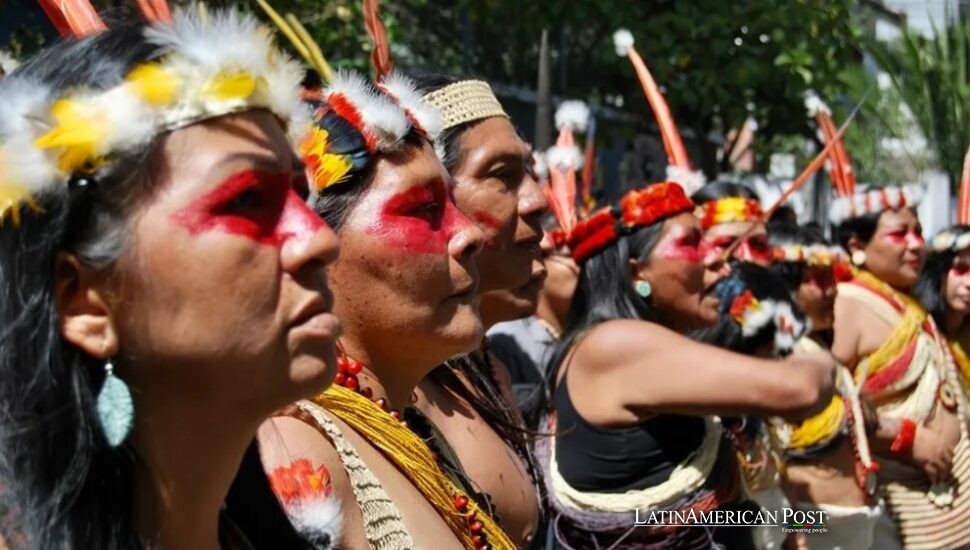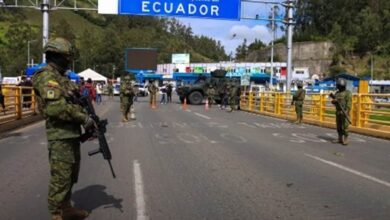Ecuador’s Hidden Guardians Chart a Future the World Can’t See

Along the Bobonaza River in Ecuador’s Pastaza province, the Kichwa families of Pakayaku move by canoe and patrol with spears, not for ceremony but survival. They defend seventy-one thousand hectares of rainforest—ancestral land mapped by hand, protected by law, and guarded by will. In a country pushing new oil roads and reopening its mining registry, its remoteness is both refuge and resistance.
The cartographer of an invisible nation
On a rough wooden table deep in the Amazon, Sacha Gayas unrolls a map the color of river mud. The rivers and ridgelines have been drawn by her own hand, the coordinates etched from memory and decades of walking. “We are the hidden people,” she tells Mongabay, her voice steady but fierce.
Gayas, fifty, wears the jungle as a second skin—her hair dyed black with wituk fruit, her cheeks painted with geometric patterns that announce belonging and intent. “Humility, loyalty, dignity,” she says, naming the three values that guide Pakayaku’s life and law. For six years, she has helped translate those principles into a digital “plan of life,” a living document that defines how the community governs its land, its schools, and its economy.
The map on her screen is both a record and an act of defiance. Pakayaku’s titled territory covers 40,000 hectares, but their true homeland—measured by hunting trails, sacred sites, and memory—spans nearly twice that. The village is reachable only by canoe, an hour and a half upriver from the port of Canelos. That distance has become their shield. “No government, no oil or mining company has been able to enter our territory,” Gayas says. “We move like mist; they never know when we are watching.“
Pakayaku’s cartography is not about ownership; it’s about permanence. The map keeps record of the unseen—birthplaces, burial sites, and the boundaries of a culture determined to survive by staying slightly out of sight.
Women with spears and grandmothers’ courage
In Pakayaku, the front line is often female. The Hurihuri guardian corps—a network of armed women—grew from the teachings of elders who once hid their families from slavers and soldiers. “We want to show ourselves to the world as people who always fight for their rights,” says Zenaida Yasacama, Pakayaku native and the first woman to serve as vice president of CONAIE, Ecuador’s largest Indigenous organization.
At thirty-two, Captain Gracia Malaver commands forty-five women. Sixteen are active at any moment; the rest, whom she calls her “sleeping jaguars,” stand ready when danger stirs. “We come from a warrior clan,” she tells Mongabay. Their weapons are palm-wood spears sharpened to points, their training constant. “When you are on the frontlines, you don’t feel fear. The fear leaves you.”
The rules are clear: strangers who enter without consent are reported to the community president and detained until they agree to respect Pakayaku’s law. “Our main goal is to protect the territory from outsiders,” says Olger Manya, a father of seven who has served in the men’s guard for twelve years. “This is the system our ancestors designed, and we keep it alive.“
Beyond their borders, Ecuador’s Amazon is under siege. Illegal mining has doubled since 2020, according to Mongabay, with groups like Los Lobos controlling operations from Napo to Zamora. In a single year, mining expanded by 500 hectares in Napo province. “They protect the ecosystem because it’s their only means of survival,” explains Basilio Suárez, a technician from the nearby Morete Cocha community. “They prohibit loggers and oil companies from entering—because if the forest falls, they fall.“
New pressures at the forest’s edge
For decades, Pakayaku’s isolation has been its strength. But now roads and policies are closing in. Leaders told Mongabay they fear President Daniel Noboa’s push to expand highways for oil and gas extraction—including what Yasacama calls “a super big road” that would cut through their land. The government has also reopened Ecuador’s mining registry after seven years, inviting new foreign investment under the watch of the International Monetary Fund, which ties loans to economic growth.
At first, the Kichwa tried dialogue. “They signed agreements thinking companies would bring schools and clinics,” says environmental lawyer David Fajardo from Cuenca. “But they learned that extractivism destroys not only the land but the spirit that binds it.“
Pakayaku’s territory has so far escaped concessions, though the oil company Pluspetrol operates nearby in Villano. The last recorded attempt to enter their area came in 2000, by Argentina’s Compañía General de Combustibles. Meanwhile, Mongabay reports the Ministry of Energy and Mines did not respond to requests for comment.
President Ángel Santi faces daily pressures of another kind. “We have been threatened for protesting, for joining strikes,” he says. Unlike government officials, he earns no salary; he pays for legal trips by selling yuca and plantain. “When we have to go to the city for paperwork, we pay everything ourselves. Nobody helps us.“
His fear is not just violence—it is fatigue. Roads and concessions creep forward, laws tighten around civil organizations, and ministries merge under economic banners. Each shift chips at the autonomy Pakayaku has guarded with silence for half a century.
A different kind of development
At sunset, Pakayaku glows with laughter and firelight. Families share bowls of chicha; elders teach children the meaning of sumak kawsay—a good life measured by balance, not consumption. The community’s six-year “plan of life,” drafted through open assemblies, sets rules for education, land use, and future income. It includes a proposal to plant 250,000 cacao trees intertwined with fruit and native plants—a design that mirrors the forest’s diversity while sustaining 250 families.
“We want to break away from the model the government imposes,” Gayas says. “We want our children to learn our own way, connected to this land.“
Inside Pakayaku’s circular meeting house, beams of sunlight pierce the roof like a cathedral. Santi adjusts a beaded headband shaped like the sun. Governance here is consensus—twenty-two council members, including the guards, must approve any significant step. “All the people must agree, or it doesn’t pass,” he explains. Equality is written into the rules. “Women must be equal to men—and here, they are.“
Pakayaku remains invisible by choice, but Santi knows survival now depends on visibility too. “We are looking for allies—people who understand that what we protect belongs to all humanity,” he tells Mongabay.
Also Read: Brazil’s Guardians of the Sea Pull Hope from the Mud
Beyond the village, the Bobonaza River curves toward the Andes, carrying stories of the hidden nation that guards it. The spears rest by the door, the map lies open on the table, and the patrols continue at dawn. In Pakayaku, invisibility is not retreat—it is strategy. And for now, it is working.





